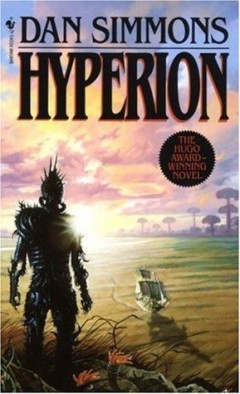I found Hyperion to be the kind of book I hope every book will be when I first crack it open. This came as a mild surprise, given that it is modeled after The Canterbury Tales, in which a group of pilgrims take turns telling their stories of how they came to the pilgrimage. It is not a structure that thrills me, but the book is so well written, the world so well-conceived, and the stakes so unique and important that I found myself agreeing with the general critical acclaim that has been heaped upon it through the years. It is unquestionably one of the best scifi novels I have ever read.
In the world of the story, Earth has long since been destroyed and humans have colonized much of the galaxy. Most worlds are connected by worm holes, though a few exist outside this system; one such world is Hyperion. On Hyperion lives the Shrike, a mysterious creature that lives to kill. It is customary for some to make a pilgrimage to where the Shrike wanders, and when the Shrike finds a group of pilgrims it kills all but one member who may then petition it. This custom, at the time of the story, has almost been abandoned, but a group is put together for one last pilgrimage as a hoard of Ousters — nomadic humans who have taken to living in zero gravity and evolved into a different species — nears the planet and prepares to attack.
The setting for the story is richly imagined, on a level with Dune, Middle Earth and other such classics. The tales of the various pilgrims take us to many different worlds, and each becomes, as it is presented to us, distinct through the grand conception and the fine details. The planet of Hyperion is especially well conceived, with enough variety, plausibility, history and ingenuity to make us wonder if it might not actually exist somewhere. It holds the Time Tombs, grand and enigmatic structures that are moving backwards in time. There is a sea of tall grass that resembles a proper sea from afar, but none may cross it on foot because of the serpents that inhabit it. There is the abandoned Poets’ City, whose inhabitants were slaughtered by the Shrike. The other worlds are also differentiated. That old cliché in scifi in which each planet has one defining characteristic — and probably one culture, one language, one government — has given way to something more realistic in recent decades, and Hyperion is a prime example of this welcome trend.
Simmons makes the most of the settings with his knack for description. He puts the characters in interesting places, and fascinating situations, and then appeals to the right senses at the right time to make us feel a part of it. Before anything is said, before any character is met, before any conflict erupts the reader finds himself drawn into the world by the rich description of it, a description that neither skimps nor dawdles. There is a scene near the end where the pilgrims reach a mountaintop structure to rest for the night while the Ouster invasion begins in the skies above. Alone and blown by cold mountain winds, they watch the light display, knowing they could run into the Shrike at any time. Whatever interesting plot points an author can invent, they are so much more gripping when the setting and situation are compelling, and Simmons positively excels at making them so.
It is worth noting that the novel’s present time is as fascinating to the reader as are the pilgrims’ tales, which are all cleverly imagined, though there is some gap between the very best and the least of them. They run the gamut from detective story to touching family tale to war adventure. None are poor, and some would make excellent novellas all by themselves. The only commonalities between them are the connection with the planet Hyperion and a certain delicate ache of loss, a single sensibility Simmons evokes in various ways but which always leave the reader with the same reflective mood and the same feeling in the breast.
We could spare a paragraph or two to mention the flaws in the book, which are few and relatively minor. I was irritated at times with the description of the characters, which seemed excessive, unimportant and difficult to accept. By difficult I mean that Simmons exhibits a physiognomist’s flair for discovering character traits in small features that I, in real life, would not even notice, much less be able to read in such detail. Any experienced reader will have run into this before: characters with a Nordic upper lip but a Mediterranean lower lip, and a prominent nose that hints at a miserly spirit, to create an example no more or less silly than what one encounters in the novel. Frankly, it is a waste of ink and parchment, but the descriptions typically last only a paragraph and there are not so many characters that the story becomes saturated with them.

One could also lodge a minor complaint about the pilgrims. We should be careful not to overstate the case, but I felt that some were not fully distinct individuals. I could remember them when their stories were finally told, but in any given stretch of tagless dialogue, I would occasionally forget who was delivering which line. There was one character who stood out, but then Simmons goes a bit too far and makes him almost a caricature. His every line is packed with his personality such that I began to feel that it was being forced on me. I would like to have seen a bit more middle ground, with characters who did not need to show off for the reader, but who nevertheless could be recognized as themselves. Perhaps Simmons thought he was doing this with the detailed physical descriptions.
If I were to hazard a guess as to Simmons’ politics, I would say he fancies himself as some kind of realist, probably with mildly left leanings. There is no overt political theme in the novel, and the flaws of everything from business to bureaucracy are exposed or at least hinted at. Though there may be nothing for the libertarian to get too excited about, there at least is no egregious nonsense in it, such as a successfully centrally planned economy.
Very little is wrong with Hyperion, and very much is right. I do not often reread books, but I can see myself revisiting this one a few years down the road. It is a great story told in a fascinating world with generally exquisite prose. If the reader is looking for a good book, he should consider making it his next one. I might even suggest dropping the one he is reading now in its favor.
















Comments on this entry are closed.
Walter Foddis September 19, 2013 @ 3:49 pm | Link
I also loved the Hyperion series and have been thinking about re-reading at some point. And I rarely re-read a novel. In fact, I don’t think I have yet! Because of this series, I’ve been reading a lot more of Simmons. I have noticed that he tends to incorporate abstract ideas, which appeals to my philosophical side. I’m currently into Flashback and just reached the part where the old economist, who is likely libertarian, explains to the retired English professor, Leonard, why the economy is falling apart. The economist discusses how the debt is out of control (e.g., crazy debt-to-GDP ratio) and makes references to surging entitlement programs and failed stimulus spending. Leonard is a liberal Democrat and was an Obama supporter, but seems to have changed his mind over the years because of the continuing failed economic policies. (I’m trying not to read reviews online so as to avoid spoilers.) Anyway, I’m on Chapter 11. Have you read Flashback?
Matthew Bruce Alexander September 26, 2013 @ 8:46 am | Link
Walter Foddis,
I have not read Flashback, but I would be interested to read anything Simmons writes. You certainly make it sound interesting. Maybe I’ll put it on my list.
Thanks for stopping by!
Walter+Foddis September 19, 2013 @ 4:41 pm | Link
Also, noted that you wrote a novel, checked out a few of the very favourable reviews on Amazon and downloaded a copy! I’m eager to support aspiring authors, especially those with a a libertarian bent.
Matthew Bruce Alexander September 26, 2013 @ 8:46 am | Link
Thanks so much! I truly appreciate it. I hope you enjoy.
Jabbamonkey March 5, 2018 @ 7:42 pm | Link
I loved the book. I think it’s important to note, that the first book ends on a HUGE cliffhanger. Yes, great book, but you have to keep reading to “find out what happens” … You are reading a series and not “a book”. I loved the book, and was so excited to find out what would happen… Then, it was like the Soprano’s fade-to-black. Happy with what I read… But so upset I HAD to read an entire OTHER book.